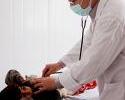There are many environmental factors that could lead to autism, according to research published in Cerebral Cortex. The research shows it is more common in premature babies. Today, extremely early preterm neonates are surviving at record rates, thanks to advances made in intensive care units all around the world.
However, infants born more than 13 weeks prematurely have a higher than average risk of developing brain damage, autism spectrum disorder, attention deficit hyperactivity disorder and learning difficulties.
These babies are exposed to several stress factors during the critical period of brain development and it’s possible that this could play a key role in the development of autism.
Autism Statistics in the U.S.
In the United States, approximately 1 in 68 children are diagnosed with autism, according to the Centers for Disease Control and Prevention.
Autism is reported to happen in all racial, ethnic and socioeconomic groups. However, the disorder is way more common in boys than it is in girls.
Autism spectrum disorder is normally traced to genetic factors, even if there has been no autism gene detected.
Researchers from the Karolinska Institutet Hospital in Sweden studied more than 100 babies who had been born extremely preterm, before the 27th week, or at the start of the third trimester.
With the approval of parents, the team of researchers examined the growth of the babies’ brains through the use of magnetic resonance imaging (MRI) during the neonatal period and then they were screened for autism features at the age of six.
Of these extremely preterm infants approximately 30 percent developed the symptoms of autism, when compared with babies who were born full term with a rate of 1 percent.
These findings are suggestive that low birth weight and complications possibly leading to an increased risk of autism.
Additionally, among infants born prematurely, during the neonatal period, researchers observed differences in the brains of preemies who later developed autism and those who did not.
Among the infants that developed autism, diminished growth was noted in portions of the brain involved in social contact, language development and empathy. All of these functions are impaired in children who have autism.
Conclusion:
Dr. Ulrika Aden lead study researcher states, “Our study shows that environmental factors can also cause autism. The brain grows best in the womb, and if the developmental environment changes too early to a life in the atmosphere, it can disrupt the organization of cerebral networks. With new therapeutic regimens to stimulate the development of such babies and avoid stress, maybe we can reduce the risk of their developing ASD.”
It’s the hope of researchers that through early detection of the structural alterations seen in the brain could allow early identification and intervention in children at risk of developing autism spectrum disorder.

![By Aneta Meszko, Marcin Meszko (Aneta Meszko) [CC BY-SA 3.0 (http://creativecommons.org/licenses/by-sa/3.0)], via Wikimedia Comm By Aneta Meszko, Marcin Meszko (Aneta Meszko) [CC BY-SA 3.0 (http://creativecommons.org/licenses/by-sa/3.0)], via Wikimedia Comm](https://www.brainphysics.com/sites/default/files/images/Nina_skrajny_wcze?niak.jpg)


![By gilmae from Sydney, Australia (Flickr) [CC BY-SA 2.0 (http://creativecommons.org/licenses/by-sa/2.0)], via Wikimedia Commons By gilmae from Sydney, Australia (Flickr) [CC BY-SA 2.0 (http://creativecommons.org/licenses/by-sa/2.0)], via Wikimedia Commons](https://www.brainphysics.com/sites/default/files/images/256px-Girls_playing_in_a_small_pool.thumbnail.jpg)
![By Digitalkil (Own work) [Public domain], via Wikimedia Commons By Digitalkil (Own work) [Public domain], via Wikimedia Commons](https://www.brainphysics.com/sites/default/files/images/Human_Semen_in_petri_dish.thumbnail.jpg)
![© Milan Nykodym, Czech Republic [CC BY-SA 2.0 (http://creativecommons.org/licenses/by-sa/2.0)], via Wikimedia Commons © Milan Nykodym, Czech Republic [CC BY-SA 2.0 (http://creativecommons.org/licenses/by-sa/2.0)], via Wikimedia Commons](https://www.brainphysics.com/sites/default/files/images/Pregnant_woman_(4977966488).thumbnail.jpg)

![By Øyvind Holmstad (Own work) [CC BY-SA 4.0 (http://creativecommons.org/licenses/by-sa/4.0)], via Wikimedia Commons By Øyvind Holmstad (Own work) [CC BY-SA 4.0 (http://creativecommons.org/licenses/by-sa/4.0)], via Wikimedia Commons](https://www.brainphysics.com/sites/default/files/images/Gravid_-_pregnant_woman.thumbnail.jpg)